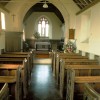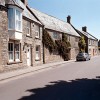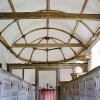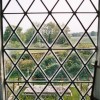July 1833. Fourteen years before the first railway tracks are to be laid in Dorset, travel is by horsepower or by sea and at Weymouth the population is in festive mood, excited at the prospect of greeting a 14-year-old Princess who will one day be Queen. It was the start of a royal tour to acquaint the people of Dorset and Devon with the woman who one day would rule over the greatest empire the world had ever seen.
Guns were fired as her yacht appeared off St. Alban’s Point and as the ship dropped anchor off the Esplanade buildings and the royal party came ashore in the royal barge, Royal Salutes were fired
Princess Victoria’s home was Kensington Palace, but Norris Castle on the Isle of Wight was her summer base. Accompanied by her mother, the Duchess of Kent, the yacht “Emerald” was towed by a naval steam packet from Portsmouth. With the Princess was her adored King Charles spaniel “Dashy”. The Duchess was “dreadfully” sea-sick on the journey along the south coast, according to Victoria’s diary, which she kept assiduously throughout and which is today preserved at Windsor Castle.
The townspeople of Weymouth turned out and greeted their royal highnesses as illustrious visitors. It seemed the whole population was proceeding from the King George III statue to the Quay. God Save the King was played as the royal party mounted the King’s Stairs used by King George III on his frequent holidays in the resort; they were then driven in carriages to the Royal Hotel facing the beach.
The following day after an official reception the princess and duchess travelled in a carriage to Melbury House in north Dorset to be entertained there by the Earl of Ilchester. They were accompanied out of town by many of the inhabitants and a detachment of Lt.Col. Frampton’s Troop of Dorsetshire Yeomanry. Every prominent building in Dorchester was decorated with flowers, and there were flags waving and the sound of bells and cannons as horses were changed en route to Maiden Newton and Melbury, where according to Victoria’s diary they arrived at about 5 p.m.
A visit to Sherborne Castle had been suggested but did not take place. While at Melbury their royal highnesses ascended a tower and had the shapes of their feet cut on the leads. They enjoyed the park, the lake, the great house, and the church.
After a two-night stay the party was on the road again at 9.15 a.m. on August 1 to be “enthusiastically received” at Beaminster, where there were arches of flowers across the road. The carriage passed through the recently opened Russell Tunnel. The Dorset County Chronicle told of “spontaneous outbursts of enthusiasm” being received everywhere the royal party went. This was at a time when there was pressure for a republic; it was the period of the Reform Act and agricultural disputes, which in a few months would become illuminated as several agricultural labourers from a small Dorset parish would emerge to become those Dorset heroes forever remembered as the Tolpuddle Martyrs.
At Bridport the ‘royals’ were given a hearty reception by the inhabitants but, according to Hine’s History of Beaminster, were angry that they were “not received by the Mayor and Corporation”. Then onto Charmouth and Lyme Regis, where there were triumphal arches – and where the “Emerald” was waiting. Every boat in port was filled with paying spectators. Here, in 1685, the Duke of Monmouth landed to lead a revolt against King James II. Mayor John Hussey, in his public address, noted that the princess’s visit was taking place on the anniversary of the Protestant Succession to the throne.
Here, as she boarded the yacht, Princes Victoria was reunited with Dashy her dog. Sailing to Torquay, she remarked on the beautiful coastline and cliffs but both she and her mother were sick on approaching Torquay. From there, after an overnight hotel stay it was off by sea to Plymouth for several days in Devon.
On August 7 an informal return trip was made by coach, changing horses at six places including Bridport and Dorchester, with a military escort from Winfrith to Wareham and Swanage. Passing Corfe Castle, the princess noted in her diary some of the climactic events in history that had taken place there. The reception at Swanage was unforgettable for the young princess, and she must have been sorry to leave Dorset as she embarked with her mother on the “Emerald” for “dear Norris.”
It had been close on six weeks of strenuous activity since they left London. The ‘Royal Progress’ was one of a number leading up to the crowning of Queen Victoria. When that happened, exactly five years after her tour of Dorset, the county must have been proud to have been part of the grand design.. In Sturminster Newton, Gillingham, Cerne Abbas, Sydling, and Evershot, there were demonstrations of loyalty on the occasion of the “beloved Queen’s” coronation, but most of all perhaps in those communities the Queen had visited as a girl. Celebratory dinners were held in Ilchester and Lyme Regis, and at Dorchester there was a ball and much merriment at the King’s Arms and a gathering at the Antelope Hotel and a band wound its way around the streets.
Residents of an almshouse in South Street were regaled with roast beef, plum pudding and beer. At Weymouth, meanwhile, all the shipping in the Bay and Portland Roads was gaily attired and there was a procession along the Esplanade. Along the coast at Poole no less than 2,000 Sunday school children gathered for a “substantial dinner”, while vessels at Bridport Harbour were dressed overall.
Victoria, who first learned of her destiny at the age of 10, moved into Buckingham Palace. Her marriage to Albert was to come. She served as queen until 1901, becoming Empress of India in 1876, creating a new ceremonial style of monarchy, with social rather than political emphasis, and thus preserving it, and giving her name to a whole new age of modernism and expansion.
Notes: Extract from Dorchester’s Municipal Records relating to this story:
1833: Aug 2nd. Locket, for ringing on occasion of the Duchess of Kent and the Princess Victoria passing thro’ Dorchester (Per order of the Mayor) £1.0s.0d.
Paid Oliver, Churchwarden of The Holy Trinity (Per order of the Mayor) expenses incurred on the above occasion £1.17s.0d.



